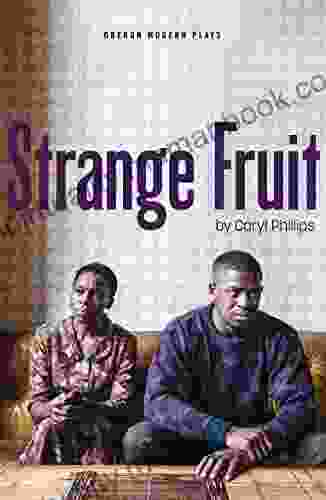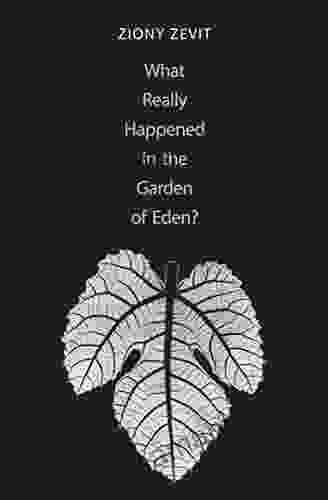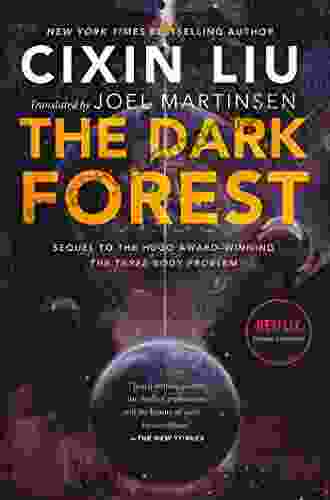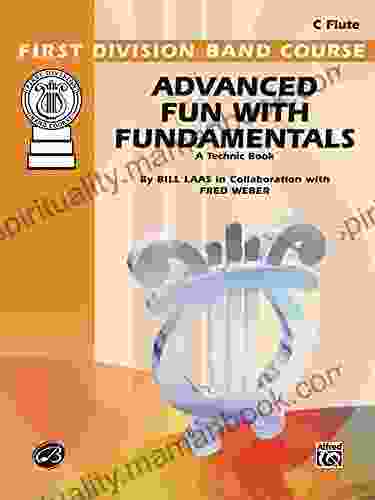What Really Happened In The Garden Of Eden: The Lewis Walpole In Eighteenth-Century Thought

The Garden of Eden has been a source of fascination for centuries, inspiring countless works of art, literature, and philosophy. But what really happened in that fateful garden? And what can it tell us about our own human nature?
4.3 out of 5
| Language | : | English |
| File size | : | 14859 KB |
| Text-to-Speech | : | Enabled |
| Screen Reader | : | Supported |
| Enhanced typesetting | : | Enabled |
| Word Wise | : | Enabled |
| Print length | : | 397 pages |
| Lending | : | Enabled |
In the 18th century, the Garden of Eden was a particularly popular subject of debate. The Enlightenment had led to a new way of thinking about the world, one that emphasized reason and science over tradition and faith. This new approach to knowledge led many people to question the traditional interpretation of the Garden of Eden story.
One of the most influential figures in this debate was Lewis Walpole, the 4th Earl of Orford. Walpole was a prominent writer and art collector, and he was also a close friend of Voltaire, one of the leading philosophers of the Enlightenment. In his writings, Walpole argued that the Garden of Eden story was not a literal account of historical events, but rather a symbolic allegory of the human condition.
Walpole's interpretation of the Garden of Eden story was based on his belief that human beings are inherently good. He argued that the fall of man was not the result of a single act of disobedience, but rather a gradual process of degeneration that was caused by the growth of luxury and corruption.
Walpole's interpretation of the Garden of Eden story was not without its critics. Some people argued that he was downplaying the importance of sin, while others accused him of being a heretic. However, Walpole's ideas were very influential in the 18th century, and they helped to shape the way that people thought about the Garden of Eden for generations to come.
Theological Implications
Walpole's interpretation of the Garden of Eden story had a number of theological implications. First, it challenged the traditional view of God as a wrathful and vindictive being. Walpole argued that God is a loving and merciful God who wants to forgive us for our sins.
Second, Walpole's interpretation of the Garden of Eden story undermined the doctrine of original sin. Walpole argued that we are not born into sin, but rather that we develop sinful habits over time. This view of human nature is much more optimistic than the traditional view, which holds that we are all doomed to hell because of Adam and Eve's sin.
Third, Walpole's interpretation of the Garden of Eden story emphasized the importance of free will. Walpole argued that we are free to choose between good and evil, and that we are responsible for our own actions. This view of free will is different from the traditional view, which holds that we are predestined to either heaven or hell.
Literary Implications
Walpole's interpretation of the Garden of Eden story also had a number of literary implications. First, it provided a new way of reading the Bible. Walpole argued that the Bible is not a literal account of historical events, but rather a collection of stories that are meant to teach us moral lessons.
Second, Walpole's interpretation of the Garden of Eden story inspired a new genre of literature, the Gothic novel. Gothic novels are often set in dark and mysterious places, and they often feature characters who are struggling with sin and evil. Walpole's interpretation of the Garden of Eden story provided a theological framework for these novels, and it helped to make them popular with readers.
Third, Walpole's interpretation of the Garden of Eden story influenced the development of the Romantic movement in literature. Romantic writers often celebrated the beauty of nature and the importance of imagination. Walpole's interpretation of the Garden of Eden story provided a philosophical justification for these Romantic ideals.
Cultural Implications
Walpole's interpretation of the Garden of Eden story also had a number of cultural implications. First, it helped to shape the way that people thought about the relationship between men and women. Walpole argued that men and women are equal in the eyes of God, and that they should be treated with respect. This view of gender equality was very different from the traditional view, which held that women were inferior to men.
Second, Walpole's interpretation of the Garden of Eden story helped to shape the way that people thought about the relationship between nature and culture. Walpole argued that nature is good and that culture is corrupt. This view of nature and culture was very different from the traditional view, which held that nature is dangerous and that culture is necessary to protect us from it.
Third, Walpole's interpretation of the Garden of Eden story helped to shape the way that people thought about the future of humanity. Walpole argued that we can create a better world through the use of reason and science. This view of the future was very different from the traditional view, which held that the world is doomed to decline and fall.
Walpole's interpretation of the Garden of Eden story was a complex and influential one. It had a number of theological, literary, and cultural implications, and it helped to shape the way that people thought about the world in the 18th century. Walpole's ideas are still relevant today, and they continue to inspire people to think critically about the human condition.
4.3 out of 5
| Language | : | English |
| File size | : | 14859 KB |
| Text-to-Speech | : | Enabled |
| Screen Reader | : | Supported |
| Enhanced typesetting | : | Enabled |
| Word Wise | : | Enabled |
| Print length | : | 397 pages |
| Lending | : | Enabled |
Do you want to contribute by writing guest posts on this blog?
Please contact us and send us a resume of previous articles that you have written.
 Top Book
Top Book Novel
Novel Fiction
Fiction Nonfiction
Nonfiction Literature
Literature Paperback
Paperback Hardcover
Hardcover E-book
E-book Audiobook
Audiobook Bestseller
Bestseller Classic
Classic Mystery
Mystery Thriller
Thriller Romance
Romance Fantasy
Fantasy Science Fiction
Science Fiction Biography
Biography Memoir
Memoir Autobiography
Autobiography Poetry
Poetry Drama
Drama Historical Fiction
Historical Fiction Self-help
Self-help Young Adult
Young Adult Childrens Books
Childrens Books Graphic Novel
Graphic Novel Anthology
Anthology Series
Series Encyclopedia
Encyclopedia Reference
Reference Guidebook
Guidebook Textbook
Textbook Workbook
Workbook Journal
Journal Diary
Diary Manuscript
Manuscript Folio
Folio Pulp Fiction
Pulp Fiction Short Stories
Short Stories Fairy Tales
Fairy Tales Fables
Fables Mythology
Mythology Philosophy
Philosophy Religion
Religion Spirituality
Spirituality Essays
Essays Critique
Critique Commentary
Commentary Glossary
Glossary Bibliography
Bibliography Index
Index Table of Contents
Table of Contents Preface
Preface Introduction
Introduction Foreword
Foreword Afterword
Afterword Appendices
Appendices Annotations
Annotations Footnotes
Footnotes Epilogue
Epilogue Prologue
Prologue Robert M Dunkerly
Robert M Dunkerly Adrian Van Young
Adrian Van Young Alice Ormsbee Beltran
Alice Ormsbee Beltran Emily Bartlett
Emily Bartlett Casey Morris
Casey Morris Fred Hughes
Fred Hughes Ashutosh Jaiswal
Ashutosh Jaiswal Spencer Quinn
Spencer Quinn Laura Scott
Laura Scott Michael Medina
Michael Medina Jackson Lanzing
Jackson Lanzing Richard Young
Richard Young Jean Marie Bauhaus
Jean Marie Bauhaus C J Archer
C J Archer Bonnie Belden Doney
Bonnie Belden Doney Jay Bee
Jay Bee Lindy Ryan
Lindy Ryan Wisdom Mwanaka
Wisdom Mwanaka Deborah Plummer
Deborah Plummer Sarah Mackenzie
Sarah Mackenzie
Light bulbAdvertise smarter! Our strategic ad space ensures maximum exposure. Reserve your spot today!

 Thomas PynchonStrange Fruit Oberon Modern Plays: A Haunting Exploration of Racial Injustice
Thomas PynchonStrange Fruit Oberon Modern Plays: A Haunting Exploration of Racial Injustice
 Mikhail BulgakovFeu Mathias Pascal by Sheena Binkley: A Journey of Identity and Redemption
Mikhail BulgakovFeu Mathias Pascal by Sheena Binkley: A Journey of Identity and Redemption Roland HayesFollow ·2.7k
Roland HayesFollow ·2.7k George OrwellFollow ·12.9k
George OrwellFollow ·12.9k Philip BellFollow ·6.8k
Philip BellFollow ·6.8k William GoldingFollow ·14.7k
William GoldingFollow ·14.7k Hassan CoxFollow ·10.9k
Hassan CoxFollow ·10.9k Harold PowellFollow ·16.2k
Harold PowellFollow ·16.2k Richard SimmonsFollow ·5.5k
Richard SimmonsFollow ·5.5k Duane KellyFollow ·3.7k
Duane KellyFollow ·3.7k

 Thomas Powell
Thomas PowellHair Care Essentials for Crochet Braids: A Protective...
Crochet braids are a versatile and...

 Philip Bell
Philip BellNative Nations of North America: A Comprehensive Guide
North America is home to a...

 Jackson Hayes
Jackson HayesCall Me Crazy: My Unique Journey with Green
In the kaleidoscopic tapestry of life, where...

 Graham Blair
Graham BlairUnveiling the Literary Treasures of Michigan: A Journey...
The literary landscape of...
4.3 out of 5
| Language | : | English |
| File size | : | 14859 KB |
| Text-to-Speech | : | Enabled |
| Screen Reader | : | Supported |
| Enhanced typesetting | : | Enabled |
| Word Wise | : | Enabled |
| Print length | : | 397 pages |
| Lending | : | Enabled |











